MercoPress. South Atlantic News Agency
Tag: Guatemala
-
Wednesday, December 3rd 2025 - 11:16 UTC
Brazil clinches export clearances with Philippines, Guatemala, and Nicaragua

Brazilian authorities have completed negotiations with the Philippines, Guatemala, and Nicaragua to expand agricultural exports to these countries after reaching an understanding on sanitary and phytosanitary requirements.
-
Monday, October 27th 2025 - 19:14 UTC
Guatemalan President denounces “coup attempt”
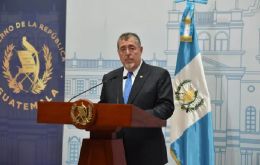
Guatemalan President Bernardo Arévalo on Sunday delivered a strong rebuke against what he called an attempted “coup,” publicly accusing Attorney General Consuelo Porras and Judge Fredy Orellana of leading a “criminal alliance” to dismantle the country's democratic institutions.
-
Friday, April 25th 2025 - 10:10 UTC
Chubut Governor and Guatemalan Ambassador discuss possible joint initiatives

Governor Ignacio Torres of the Argentine province of Chubut met with Guatemala's Ambassador Héctor Iván Espinoza Farfán on Thursday to discuss strengthening bilateral ties. “We received the Ambassador of Guatemala in Argentina, Héctor Espinoza Farfán, whom we declared Guest of Honor and with whom we started a joint work agenda, aimed at strengthening the commercial, business, and tourist exchange between both States,” Torres explained.
-
Tuesday, November 5th 2024 - 10:12 UTC
Guatemalan authorities have corruption evidence against former President Giammatei

Guatemalan authorities found enough evidence to indict former President Alejandro Giammattei for corruption in the so-called “Red Q” case. However, the Attorney General's Office should request Giammatei's immunity lifted before proceeding any further with the “abuse of authority” and “influence peddling” charges in a case of hiring an official who was later sanctioned by the United States, namely the former director of the National Electrification Institute Melvin Quijivix Vega.
-
Monday, January 15th 2024 - 20:34 UTC
Arévalo sworn in as President of Guatemala at last
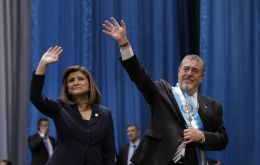
Although some ten hours later than scheduled, Bernardo Arévalo de León was eventually sworn in early Monday as Guatemala's new president for the period 2024-2028. After his inauguration, he was to offer his first speech as constitutional head of state. Before Arévalo's turn, 160 deputies took their oaths of office, thus extending the ceremony in time beyond projections.
-
Monday, December 18th 2023 - 09:56 UTC
Clearing the way for Guatemala elected president to take office in January
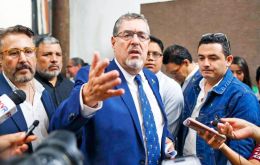
Guatemala the Central American country long linked to political instability and extreme violence in solving many of its domestic conflicts, is again a hotspot in the region since an elected president, who should be taking office in mid-January, has been facing growing supposedly 'legal' impediments to his legitimate right, supported by an overwhelming majority of voters who surprised the “political establishment”.
-
Wednesday, December 13th 2023 - 10:09 UTC
UN, US and Mercosur call on Guatemala to respect election results and denounce “an attempted coup”
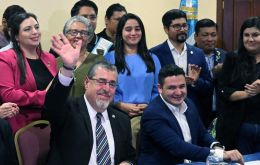
The UN Secretary-General Antonio Guterres, Mercosur member countries, the European Union and the US have called on Guatemala authorities to impede the Central American country's Attorney General's office to annul the general election result preventing President-elect Bernardo Arevalo from taking office in January.
-
Saturday, December 9th 2023 - 10:23 UTC
Guatemalan Prosecutors want June 25 elections annulled
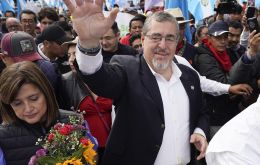
Guatemala's Public Prosecutor's Office said this week that the voter rolls used in the elections won by Bernardo Arévalo de León “were not authorized” by the Supreme Electoral Tribunal and therefore the results thereof were “null and void.” Arévalo had warned on Sept. 1 that Attorney General Consuelo Porras was carrying out a “coup d'état” against him to prevent him from taking office on Jan. 14 to succeed Alejandro Giammattei.
-
Monday, October 2nd 2023 - 09:16 UTC
Guatemala Chief Prosecutor raids the Electoral Tribunal to obstruct presidential election result

Guatemala's political crisis escalated last weekend as prosecutors raided the country's top electoral tribunal searching for documents related to August presidential election. Agents of the Attorney General's Office entered the headquarters of the Supreme Electoral Tribunal and confiscated the official lists of results from the polling stations.
-
Saturday, September 2nd 2023 - 10:55 UTC
Guatemalan President-elect says there is a coup in the making
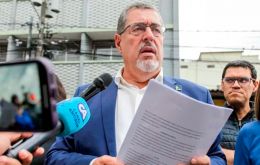
Guatemalan President-elect Bernardo Arévalo de León Friday said there was “a coup d'état in progress” in his country, with many organizations wanting to “break the constitutional order and violate democracy” by attacking him and his Semilla Movement party.
